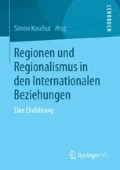Zusammenfassung
Lateinamerika zeichnet sich seit den 1990er Jahren durch eine wachsende Zahl von Regionalorganisationen aus, welche der geografischen Region politisch Gestalt gegeben, sie aber auch in verschiedene wirtschaftliche und politische Subregionen fragmentiert haben. Als ein Ergebnis hat sich Südamerika als eigenständige politische Subregion konstituiert und konsolidiert. Lateinamerika ist ein Beispiel für einen pluralistischen Regionalismus, d. h. verschiedene Regionalorganisationen bestehen nebeneinander und konkurrieren zuweilen miteinander. Zugleich überlagern sich kontinentale und subregionale Formen der regionalen Kooperation. Lateinamerika muss immer auch als Teil der Amerikas gesehen werden, und die USA sind ein wichtiger Bezugspunkt lateinamerikanischer Integrationsbestrebungen. Im Ergebnis ergibt sich ein komplexes Bild des lateinamerikanischen Regionalismus, was zu sehr unterschiedlichen Interpretationen führt.
Access this chapter
Tax calculation will be finalised at checkout
Purchases are for personal use only
Basisliteratur
Dabene, Olivier. 2009. The politics of regional integration in Latin America: Theoretical and comparative explorations. New York: Palgrave Macmillan. Das Buch gibt einen Überblick über den historischen Prozess regionaler Integration in den verschiedenen lateinamerikanischen Subregionen und stellt einen Bezug zur theoretischen Literatur her.
Heine, Jorge, und Brigitte Weiffen. 2014. 21st Century democracy promotion in the Americas. Standing up for the polity. New York: Routledge. Das Buch gibt einen Überblick von Demokratieförderung und -verteidigung im Rahmen des Interamerikanischen Systems mit der OAS als Kern, und geht auf zukünftige Herausforderungen ein.
Herz, Monica. 2011. The organization of American states (OAS). New York: Routledge. Standardwerk zur Geschichte und Struktur der OAS und ihrer Rolle in einer pluralistischen regionalen Architektur in den Amerikas.
Webseiten
ALBA: www.portalalba.org.
CRIES Anuario de integración: www.cries.org.
Mercosur: www.mercosur.int.
OAS: www.oas.org.
Pazifikallianz: alianzapacifico.net.
UNASUR: www.unasursg.org.
Verwendete Literatur
Briceño-Ruiz, José. 2014. Regional dynamics and external influences in the discussions about the model of Economic integration in Latin America. EUI Working Paper RSCAS 2014/11. Florenz: European University Institute.
Cifuentes, Manuel, und José Antonio Sanahuja, Hrsg. 2010. Una región en construcción, UNASUR y la integración en América del sur. Barcelona: CIDOB.
Fawcett, Louise, und Mónica Serrano, Hrsg. 2005. Regionalism and governance in the Americas. Continental drift. Basingstoke: Palgrave Macmillan.
Gardini, Gian Luca. 2010. The origins of Mercosur. Democracy and regionalization in South America. New York: Palgrave Macmillan.
Gardini, Gian Luca. 2013. The added value of the Pacific Alliance and ‘modular regionalism’ in Latin America. LSE IDEAS, 21 March. http://blogs.lse.ac.uk/ideas/2013/06/the-added-value-of-the-pacific-alliance-and-modular-regionalism-in-latin-america/.
Gomez-Mera, Laura. 2013. Power and regionalism in Latin America. The politics of Mercosur. Notre Dame: University of Notre Dame Press.
Legler, Thomas. 2013. The rise and decline of the summit of the Americas. Journal of Iberian and Latin American Research 19 (2): 179–193.
Malamud, Andrés. 2010. Latin American regionalism and EU studies. Journal of European Integration 32 (6): 637–657.
Malamud, Andrés. 2013. Overlapping regionalism, no integration: Conceptual issues and the Latin American experiences. EUI Working Paper RSCAS 2013/20. Florenz: European University Institute.
Malamud, Andrés, und Gian Luca Gardini. 2012. Has regionalism peaked? The Latin American quagmire and its lessons. The International Spectator: Italian Journal of International Affairs 47 (1): 116–133.
Nolte, Detlef. 2014. Latin America’s new regional architecture: A cooperative or segmented regional governance complex? EUI Working Paper RSCAS 2014/89. Florenz: European University Institute.
Nolte, Detlef, und Leslie Wehner. 2013. UNASUR and security in South America. In Regional organisations and security. Conceptions and practices, Hrsg. Stephen Aris und Andreas Wenger, 183–202. New York: Routledge.
Palestini Céspedes, Stefano, und Giovanni Agostinis. 2014. Constructing regionalism in South America: The cases of transport infrastructure and energy within UNASUR. EUI Working Paper RSCAS 2014/73. Florenz: European University Institute.
Pastor, Robert. 2011. The North American idea. A vision of a continental future. Oxford: Oxford University Press.
Portales, Carlos. 2014. ¿A dónde va el multilateralismo en las Américas? Proyectos superpuestos en un periodo de cambios globales. Pensamiento Propio 19 (39): 35–74.
Riggirozzi, Pia, und Diane Tussie, Hrsg. 2012. The rise of post-hegemonic regionalism. The case of Latin America. Dordrecht: Springer.
Sanahuja, José Antonio. 2012. Post-liberal regionalism in South America: The case of UNASUR. EUI Working Paper RSCAS 2012/05. Florenz: European University Institute.
Saraiva, Miriam Gomes. 2010. Brazilian foreign policy towards South America during the Lula administration: Caught between South America and Mercosur. Revista Brasileira de Política Internacional 53:151–168 (special edition).
Tussie, Diana. 2009. Latin America: Contrasting motivations for regional projects. Review of International Studies 35 (1): 169–188.
Weiffen, Brigitte, Leslie Wehner, und Detlef Nolte. 2013. Overlapping regional security institutions in South America: The case of OAS and UNASUR. International Area Studies Review 16 (4): 370–389.
Author information
Authors and Affiliations
Corresponding author
Editor information
Editors and Affiliations
Rights and permissions
Copyright information
© 2017 Springer Fachmedien Wiesbaden GmbH
About this chapter
Cite this chapter
Nolte, D. (2017). Lateinamerika. In: Koschut, S. (eds) Regionen und Regionalismus in den Internationalen Beziehungen. Springer VS, Wiesbaden. https://doi.org/10.1007/978-3-658-05434-2_8
Download citation
DOI: https://doi.org/10.1007/978-3-658-05434-2_8
Published:
Publisher Name: Springer VS, Wiesbaden
Print ISBN: 978-3-658-05433-5
Online ISBN: 978-3-658-05434-2
eBook Packages: Social Science and Law (German Language)

